Introduction
In 1996, the SAF introduced the SAF 7 Core Values (SCVs) as a set of shared values for the 3 Services. Subsequently in 2013, Safety was included as the 8th SAF Core Value. The aim was to inculcate the SCVs in the 3 Services by raising awareness, acceptance and application of the core values through both formal core values lectures and informal activities. Because the goal was to promulgate the SCVs, a prescriptive, "explaining" approach supported by role-modeling was emphasised. Such an approach would influence people to function based more on rules and guidelines rather than internalising the values as their own.
Today, the operational environment calls for SAF personnel at all levels to make judgements and choices with significant consequences without any clear right or wrong to guide decisions. Rules-based functioning is of limited use. If we want our SAF leaders and soldiers to internalise and apply the SAF Core Values as their own, we will need to go beyond just helping people remember the values or understand the meaning and importance of the Core Values to the organisation. An effective values inculcation framework allows individuals to engage in the process of finding meaning and relevance in their own lives through constant clarification and alignment with the SAF Core Values in the context of the SAF Mission and Purpose.
It is useful to take a more holistic approach to develop the components of this process, determine the desired outcomes that we want and identify the conditions and/or "threats" to the effective inculcation and application of values in the SAF. This approach is based on two principles - Positive Role Modeling and Vicarious Learning, and Self and Group Reflection and Discussions.
The SAF's operational readiness is critically dependent on the strength and character of its people. It depends a great deal on the individuals' beliefs, their character, and their common perception of right and wrong. The SAF Core Values undergird and define these intangibles and provide a unifying force for all members of the SAF. These shared values will serve as a guide for individual and organisational behaviour so that soldiers, airmen and sailors go about their diverse tasks sharing the same conviction, and united towards a common goal.
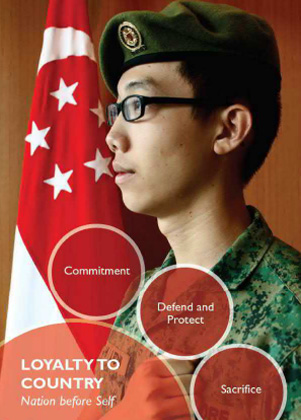
Loyalty to Country
LOYALTY TO COUNTRY expresses our commitment to defend the sovereignty of our nation and to protect all that is cherished: our way of life, homeland, family and national interests.
"Loyalty to Country" is best expressed in the Oath of Allegiance taken by every Soldier, Sailor and Airman upon entering service with the SAF. Irrespective of our background and personal beliefs, this oath affirms our commitment to defend our nation. Whether we call it patriotism, a sense of duty or service to the nation, what counts is that we do not take the easy way out when confronted with tough choices, especially when faced with life and death situations.
Being loyal also means putting the country's and the SAF's interest before self. In the expanded spectrum of operations, our duty requires us to participate in operations other than war, such as peacekeeping and humanitarian support missions, to safeguard our national interests. The potential endangerment of our lives is something we face and accept as part of every mission, whether it involves deterrence, diplomacy, nation-building, peacekeeping, humanitarian relief or war.
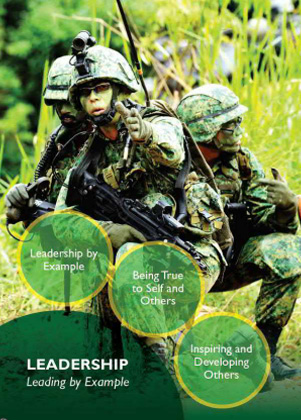
Leadership
To demonstrate LEADERSHIP is to display the highest character, to inspire others and to uphold what the SAF stands for. Leaders must take charge, lead by example, role model the desired behaviour, inspire and motivate others to fulfil their full potential. Above all else, the leader must be a good role model.
As the SAF moves towards network-centric warfare where command is centralised and control is decentralised, individual servicemen and servicewomen are expected to operate autonomously and cross-functionally in task-configured units. In such an environment, leaders must be flexible, adaptive and work effectively in teams to handle new paradigms under conditions of change, uncertainty and complexity.
Being part of the military profession means that the SAF leaders at every level must be able to develop strong soldiering qualities in the troops, to lead by example and build a common sense of purpose and pride in their troops. They need to by trustworthy and inspire confidence in others so that the men will entrust their very lives to them.
The leader must take the initiative to influence and motivate their followers to carry out their tasks confidently and to the best of their ability.
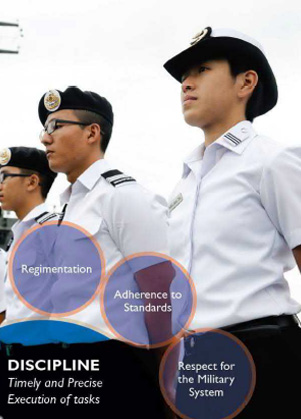
Discipline
DISCIPLINE ensures the responsible obedience of orders and the readiness to respond to emerging threats. It demands a respect for and appreciation of the military system and the role the military plays in defending the nation. Discipline is a defining characteristic of the military combatant. It is built through vigorous training, drills and self-control; reinforced by mental stamina, inner strength and physical toughness.
Individual Soldiers, Sailors and Airmen must appreciate that they are part of a larger system, and what they do or fail to do can critically impact the outcome of the overall mission. This kind of discipline builds trust in the system. It gives us the courage and will to continue with the mission even under the most demanding circumstances.
The essence of discipline is the respect for the military system even when it is difficult and painful, and doing it to the best of our abilities. Such discipline is cultivated through regimentation and tough training geared towards operational readiness and combat effectiveness. At the same time, commanders instill discipline by ensuring that their orders are lawful, ethical and well-reasoned, guided by the principles of leading by example, open communication, consistency and care for soldiers.
For the SAF to operate successfully in a network-centric environment, our people must possess a respect for the system while being flexible and adaptive to changes. We need to demonstrate a balance between autonomy of action and appreciation of the responsibilities that come with being a part of a larger system.
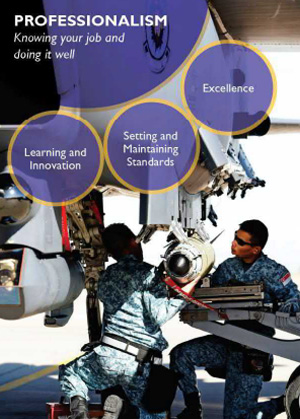
Professionalism
PROFESSIONALISM demands the highest standards of excellence and competence from each individual Soldier, Sailor and Airman in the SAF. In the military service, that calls for unlimited liability, this means knowing our roles and responsibilities, giving our best in all that we do, as well as learning and training continuously to sustain operational readiness. Professionalism requires a systems perspective, creating new ideas and solving problems through innovation, networking and the sharing of ideas.
Training enhances the professional knowledge and competencies of our troops in their various areas of expertise, thus enabling them to better meet new operational challenges.
Being professional also means valuing learning and taking every opportunity to learn from others with a humble heart and an earnest mind. They are competent Soldiers, Sailors or Airmen who know their job well, and yet continue to hone and improve their skills to achieve excellence. They put the interest of the organisation before self and discharge their duties professionally, with vigour and dedication.
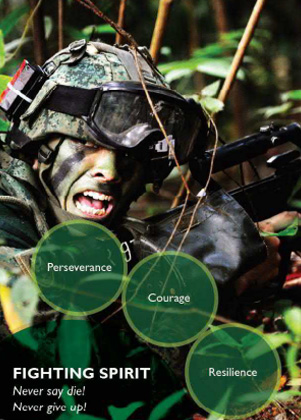
Fighting Spirit
FIGHTING SPIRIT drives us to boldly execute our mission with courage, tenacity and resilience. As a formidable Armed Forces, we engage our hearts, minds and bodies with conviction, no matter what the risks are. Whether in face of fear, uncertainity or in executing everyday mundane tasks, we press on and never give up.
Our Fighting Spirit is marked by determination, aggressiveness and perseverance. It gives us the will and boldness to engage decisively in battle and secure victory. It is also the dedication and motivation to overcome obstacles and achieve our mission against all odds.
The rise of unconventional warfare (e.g. operations other than war, low intensity conflict, terrorist threats) means that we must not only be flexible and adaptable to deal with volatile and complex operating environment but also have the tenacity to remain vigilant while carrying out more routine tasks such as guarding and protecting key installations.
For the SAF to be a credible fighting force, having the hardware operated by capable personnel is foundational. However, to have us unleash the full potential of our capabilities, we need to get the "heartware" right - we need to have each and every one of us fully engaged and committed, energised and ready to fight whenever and wherever we are called upon.
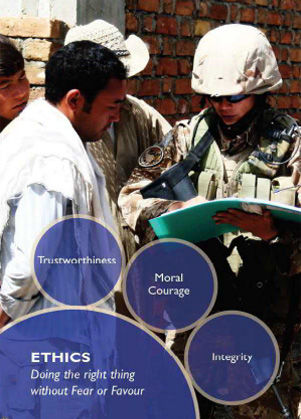
Ethics
ETHICS represents the personal and professional integrity that upholds the noble calling of military service in the SAF. It unites honesty, trustworthiness and uprightness of character with the moral courage to choose to do what is right in peacetime and in war.
In the context of the SAF, ethics concerns the moral courage to do what is right even at personal cost. It is shown through one's exemplary conduct and willingness to take responsibility and be accountable for one's actions and decisions. It means being honest and accurate in one's reporting, having integrity in one's dealing with others and not misusing one's position or power against others for selfish gain. As leaders, it is important for us to identify and deal with threats to our Core Values.
Upholding a high standard of ethical conduct should become second nature for every member of the SAF, as every individual is an embodiment of the organisation. As members of the SAF, we are to conduct ourselves by the highest ethical standards. In all our actions and decisions, we are accountable not only to ourselves, but also to our fellow comrades in arms, the SAF at large, and the general public.
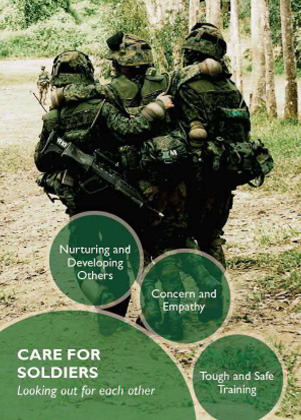
Care for Soldiers
CARE FOR SOLDIERS embodies genuine care and concern for the well-being of fellow comrades, their families and those we pledge to protect. Care goes beyond ensuring safety, adequate rest, tough training and providing proper rations and equipment, to supporting physical, emotional and mental fitness and health.
Every Commander is morally responsible for the care of those under his or her command and to treat every servicemen and servicewomen with respect and dignity regardless of background and culture, in peacetime and during operations.
Care for Soldiers is not the sole responsibility of commanders and leaders. It is also to be seen in daily encounters between buddies. Care for fellow soldiers can take the form of coaching and helping each other during training, or looking out for each other in war.
We put our Soldiers, Sailors and Airmen through tough and realistic training to prepare them to fight and survive in battle. At the same time, we must show empathy and exercise care so as to avoid unnecessary injuries or death during training. Caring is not about making training easy, but ensuring that our people are well-trained and equipped with the necessary knowledge and skills to safely operate their equipment and execute their tasks. As aptly put by Field Marshal Erwin Rommel, "the best form of welfare for the troops is first-class training."
Care for Soldiers is absolutely essential for the building of commitment, confidence and cohesion of the troops, and ultimately, combat effectiveness and mission success. Leaders and Commanders who care for the training, morale and discipline of their troops can be sure they have a loyal and fighting-fit force at hand.
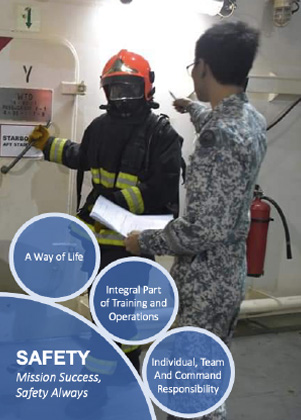
Safety
Each of us has a crucial part to play, by adopting SAFETY as a Core Value and making it a way of life in our units.
Safety is an integral part of training, operations and mission success. We cannot consider ourselves successful if we achieve one without the other. Our country demands that we maintain a high level of operational readiness through tough and realistic training. At the same time, our countrymen require us to do our utmost to keep their sons and loved ones safe, both during training and operations. To achieve these dual imperatives, we must ensure that our training is tough, realistic and, at the same time, safe.
Safety is an individual, team and command responsibility. It involves every one, every time, all the time. Being mindful of safety and adhering to safety regulations should be second nature to each individual. Beyond this basic requirement, every one of us is expected to be a safety advocate, championing safety in his or her own area of work. We mus tbe pro-active in proposing improvements to our safety practices and forthcoming in reporting safety incidents, near misses or unsafe acts.
As members of a team, we must always look out for one another and take care of each other through the buddy system. As leaders, we play a pivotal role in setting the right safety standards, expectations and culture for our men and women. This is achieved not just through words and personal example, but also through the systems and processes that we put in place.